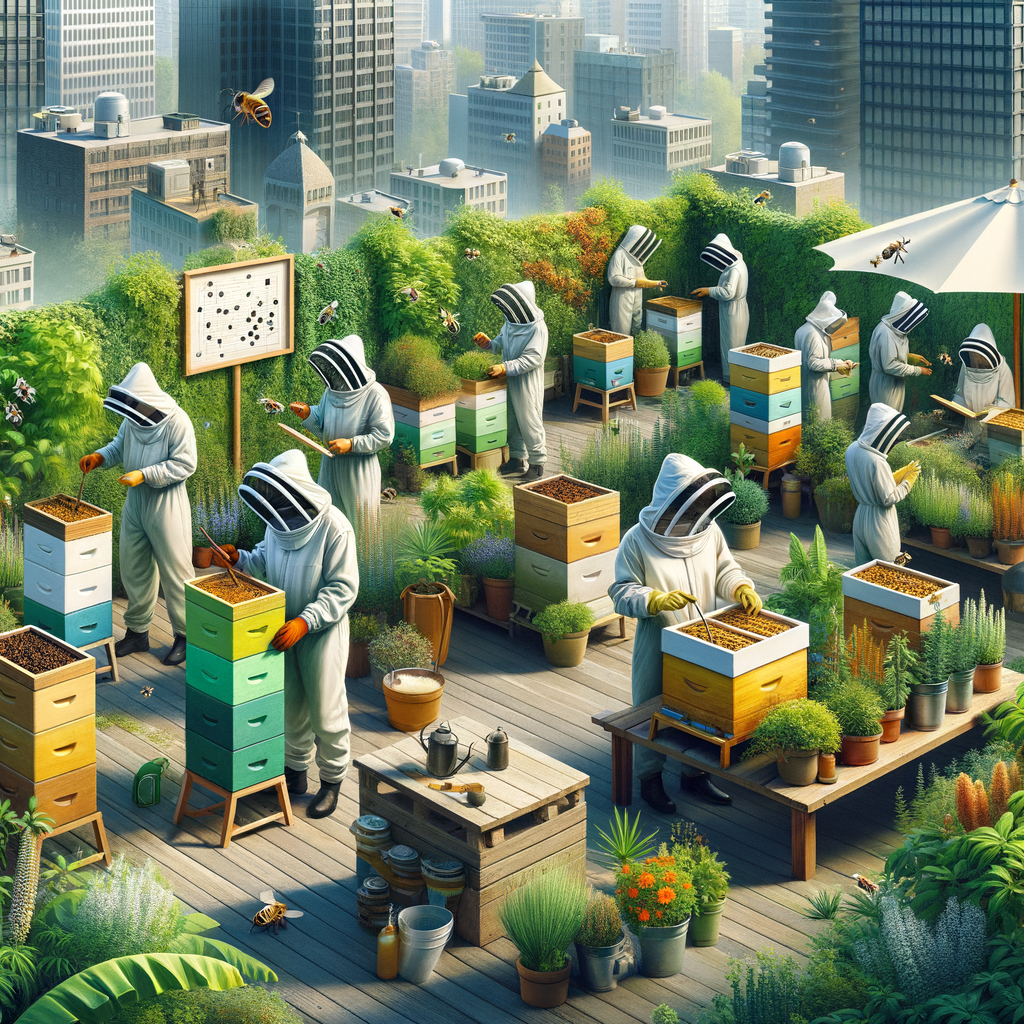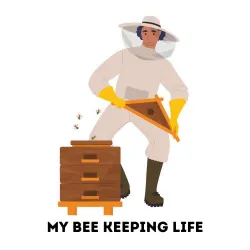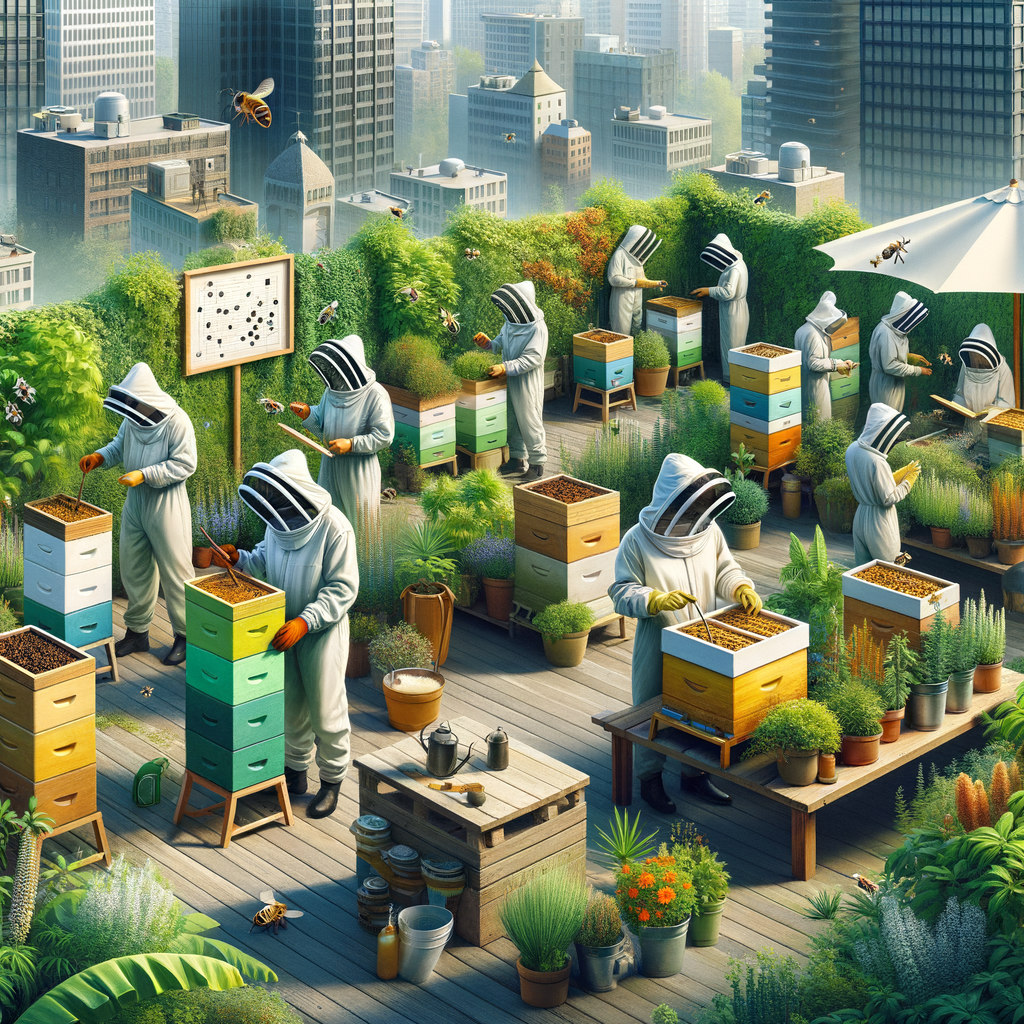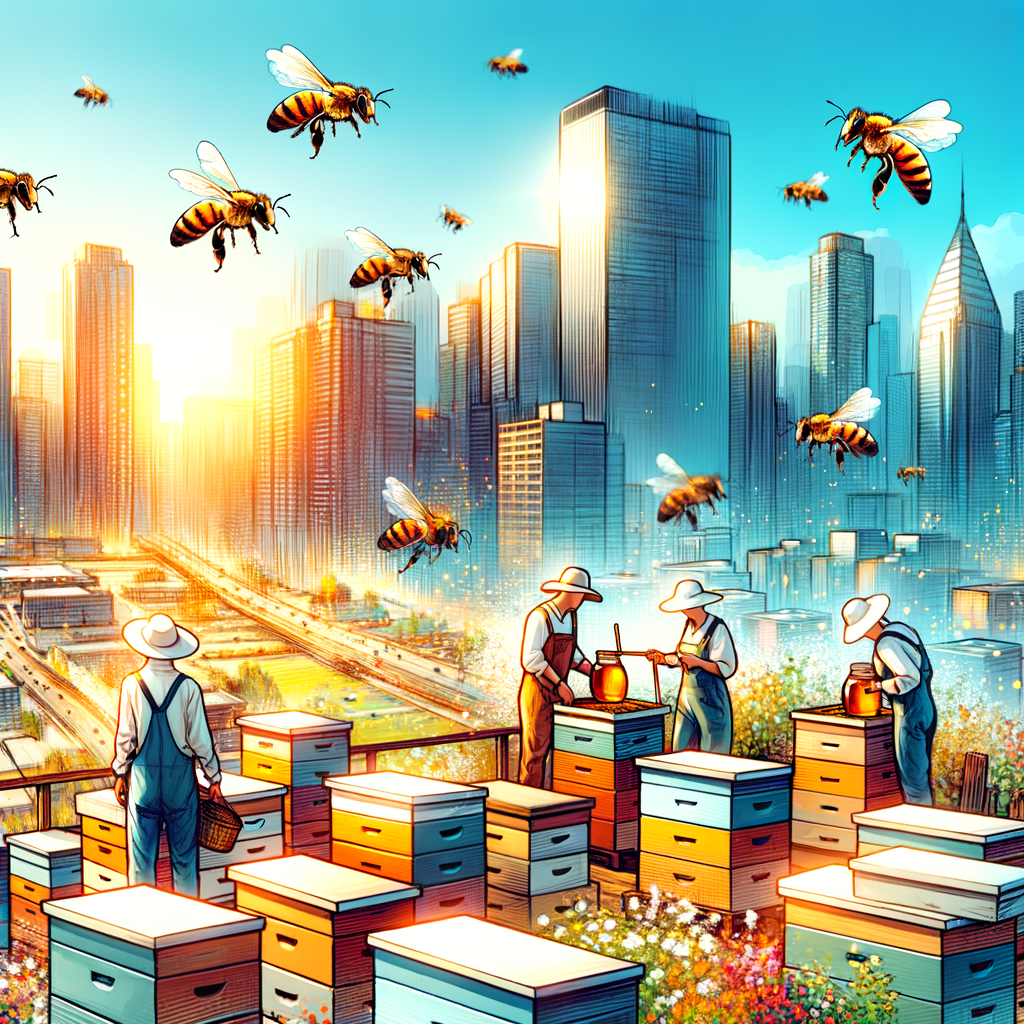
Introduction to Urban Beekeeping Education
Urban beekeeping is a fascinating and increasingly popular activity. It involves the keeping and care of honey bees in an urban environment. This practice is not only beneficial for the bees but also for the city’s ecosystem. However, to be successful in urban beekeeping, one needs to have a proper understanding and education about it.
-
- Understanding the concept of urban beekeeping
Urban beekeeping is a practice that involves raising bees in a city or town. Unlike traditional beekeeping, which typically takes place in rural areas, urban beekeeping happens in the heart of the city. This practice is becoming more popular as people realize the importance of bees in our ecosystem and the need to protect them.
Urban beekeeping is not just about producing honey. It’s also about helping to increase the population of bees, which are essential for pollinating plants. Without bees, many of the foods we enjoy would not exist. Therefore, urban beekeeping plays a critical role in our food production and overall ecosystem.
-
- The importance of education in urban beekeeping
Education is a crucial component of successful urban beekeeping. Without proper knowledge and skills, one can inadvertently harm the bees or fail to provide them with the care they need. Education in urban beekeeping can help individuals understand the behavior of bees, learn how to handle them safely, and know how to maintain a healthy hive.
Moreover, education can help urban beekeepers understand the laws and regulations related to beekeeping in their city. This is important as different cities have different rules about where and how beehives can be kept. Therefore, being educated in urban beekeeping can help individuals navigate these rules and ensure they are keeping their bees legally and ethically.
However, to be successful, one needs to have a proper understanding and education about it. By learning about the behavior of bees, how to care for them, and the laws related to beekeeping, individuals can contribute positively to their city’s ecosystem and enjoy the sweet rewards of their hard work.
The Role of Education in Beekeeping
Education plays a pivotal role in the world of beekeeping, especially in urban settings. It equips individuals with the necessary knowledge and skills to successfully manage bee colonies, ensuring their health and productivity. Let’s delve deeper into the specifics of urban apiculture education and its importance.
Urban Apiculture Education
Urban apiculture education focuses on teaching city dwellers how to keep bees in an urban environment. This type of education is unique because it addresses the specific challenges and opportunities that come with urban beekeeping.
-
- How education empowers urban beekeepers
Education empowers urban beekeepers by providing them with the knowledge they need to manage their hives effectively. For instance, they learn about the types of bees suitable for urban settings, how to handle bees safely, and how to harvest honey without harming the colony. This knowledge not only boosts their confidence but also enhances their ability to keep healthy and productive bees.
-
- Key components of urban apiculture education
Urban apiculture education comprises several key components. These include understanding bee biology, learning about hive management, recognizing and managing pests and diseases, and understanding local regulations related to beekeeping. Additionally, urban apiculture education also covers the ethical considerations of urban beekeeping, such as ensuring the bees have enough food and are not causing a nuisance to neighbors.
It equips beekeepers with the necessary knowledge and skills to manage their hives effectively, ensuring the health and productivity of their bees. Furthermore, it promotes sustainable and ethical beekeeping practices, contributing to the overall well-being of our urban ecosystems.
Importance of Education in Urban Beekeeping
Education plays a crucial role in urban beekeeping. It not only equips beekeepers with the necessary skills but also promotes the health and productivity of bees. Let’s delve into the importance of education in urban beekeeping.
- Enhancing Bee Health and Productivity
Education is key to enhancing bee health and productivity. Beekeepers who are educated about the needs and behaviors of bees can provide better care for their hives. For example, they can learn how to prevent diseases and pests that can harm bees. They can also learn about the best practices for feeding and caring for bees to ensure they are healthy and productive.
Did you know that a healthy bee colony can produce up to 100 pounds of honey in a year? That’s a lot of honey! But this is only possible if the bees are healthy and well cared for. Education can help beekeepers achieve this goal.
- Promoting Sustainable Urban Beekeeping Practices
Education also promotes sustainable urban beekeeping practices. Sustainable beekeeping is all about keeping bees in a way that is good for the bees, the environment, and the community. Educated beekeepers can learn how to manage their hives in a way that is beneficial to all.
For instance, they can learn about the importance of planting native flowers and plants that bees love. They can also learn about the best ways to harvest honey without harming the bees or the hive. This way, they can ensure that their beekeeping practices are sustainable and beneficial to everyone.
It not only enhances bee health and productivity but also promotes sustainable practices. So, if you’re interested in urban beekeeping, make sure to get the right education!
| Key Benefits of Education in Urban Beekeeping |
|---|
| Enhances bee health and productivity |
| Promotes sustainable urban beekeeping practices |
Beekeeping in Urban Areas
Urban areas, with their concrete jungles and bustling streets, may not seem like the ideal place for beekeeping. However, with the right knowledge and tools, it is entirely possible to maintain a thriving beehive in the heart of the city. Let’s delve into the unique challenges of urban beekeeping and how education can provide solutions.
Challenges and Solutions
- Understanding the Unique Challenges of Urban Beekeeping
Urban beekeeping presents a unique set of challenges. The limited green spaces, noise pollution, and the close proximity of human populations can make it difficult for bees to thrive. However, understanding these challenges is the first step towards finding solutions.
One of the main challenges is finding suitable locations for hives. Urban areas lack the vast green spaces that bees need to forage. Additionally, the noise and air pollution can stress the bees, affecting their health and productivity.
Another challenge is the potential conflict with human populations. Bees can be perceived as a nuisance or even a threat by people who are not familiar with beekeeping practices. This can lead to complaints and legal issues for urban beekeepers.
- How Education Can Provide Solutions
Education is the key to overcoming these challenges. By educating ourselves and others about the importance of bees and the practice of beekeeping, we can create a more bee-friendly environment in our cities.
Education can help urban beekeepers find creative solutions for the lack of green spaces. For example, rooftop gardens and community parks can serve as excellent foraging grounds for bees. Additionally, learning about bee-friendly plants can help beekeepers create a suitable environment for their hives.
Education can also help mitigate conflicts with the local community. By educating the public about the importance of bees and the safety measures taken by beekeepers, we can dispel fears and misconceptions. This can lead to greater acceptance and support for urban beekeeping initiatives.
While urban beekeeping presents unique challenges, education can provide effective solutions. By understanding the challenges and leveraging education, we can create a thriving environment for bees in our cities.
Case Study: Successful Urban Beekeeping Initiatives
Urban beekeeping has seen a surge in popularity in recent years. Let’s explore some successful initiatives that have made a significant impact in their communities.
- Highlighting successful urban beekeeping projects
One of the most successful urban beekeeping projects is the Philadelphia Beekeepers Guild. Established in 2009, this non-profit organization has been instrumental in promoting urban beekeeping through education, advocacy, and outreach. The Guild has over 100 active members and has helped establish multiple apiaries across the city.
Another successful initiative is the Bee Urban project in London. This project focuses on promoting the importance of bees in urban environments. They have established several apiaries in parks across the city, providing a safe haven for bees and a unique educational resource for the community.
- Role of education in these success stories
Education plays a crucial role in the success of these urban beekeeping initiatives. Both the Philadelphia Beekeepers Guild and Bee Urban offer workshops and training sessions to educate the public about the importance of bees and the basics of beekeeping.
In Philadelphia, the Guild conducts regular ‘Beekeeping 101’ classes that cover everything from hive construction to honey extraction. They also host monthly meetings where members can share experiences and learn from each other.
In London, Bee Urban offers a range of workshops for schools, community groups, and individuals. These workshops cover topics like bee biology, the role of bees in our ecosystem, and practical beekeeping skills.
By educating the public, these initiatives not only promote the practice of urban beekeeping but also help create a more informed and supportive community. This community support is essential for the success and sustainability of urban beekeeping initiatives.
These case studies demonstrate that with the right education and community support, urban beekeeping can thrive and make a positive impact on our cities and our environment.
Beekeeping Courses in Cities
Urban areas are becoming increasingly popular for beekeeping. This surge in interest has led to a rise in beekeeping courses tailored specifically for city dwellers. These courses provide the necessary knowledge and practical skills to successfully manage a hive in an urban environment.
Urban Beekeeping Training
Urban beekeeping training is a specialized form of education that focuses on the unique challenges and opportunities of keeping bees in a city setting. Let’s delve into the details of these courses and the benefits they offer.
-
- Overview of Available Urban Beekeeping Courses
There are a variety of urban beekeeping courses available, each designed to cater to different levels of experience and interest. Some courses provide a basic introduction to beekeeping, covering topics such as bee biology, hive management, and honey extraction. More advanced courses delve into the intricacies of urban beekeeping, including dealing with city regulations, managing pests, and maximizing honey production in a limited space.
-
- Benefits of Hands-On Beekeeping Training
Hands-on beekeeping training offers numerous benefits. It gives students the opportunity to apply what they’ve learned in a practical setting, under the guidance of experienced beekeepers. This hands-on experience can be invaluable in building confidence and honing skills. Furthermore, it allows students to familiarize themselves with the equipment and techniques they’ll be using, reducing the likelihood of mistakes when they start their own hives.
They offer both theoretical knowledge and practical skills, ensuring that students are well-equipped to start their own urban hives.
Education for City Beekeepers
City beekeepers, like their rural counterparts, need to continually update their knowledge and skills to ensure they are up-to-date with the latest beekeeping techniques and challenges. This section will delve into the continuing education opportunities available for city beekeepers and the impact of ongoing education on urban honey production.
- Continuing Education Opportunities for City Beekeepers
Continuing education for city beekeepers is vital for their success. It allows them to stay informed about the latest research, techniques, and equipment in the field of beekeeping. There are various ways city beekeepers can continue their education.
| Education Opportunities | Description |
|---|---|
| Local Beekeeping Associations | These associations often offer workshops, seminars, and lectures on various aspects of beekeeping. |
| Online Courses | There are numerous online platforms offering comprehensive beekeeping courses that cover everything from the basics to advanced techniques. |
| Books and Magazines | There are many books and magazines available that provide valuable information on beekeeping. |
- Impact of Ongoing Education on Urban Honey Production
Ongoing education has a significant impact on urban honey production. Knowledgeable beekeepers can effectively manage their hives, leading to healthier bees and increased honey production.
For instance, through continuing education, city beekeepers can learn about the best practices for managing pests and diseases, which are common challenges in urban beekeeping. They can also learn about the optimal times for honey extraction, which can significantly increase their honey yield.
It equips city beekeepers with the necessary knowledge and skills to successfully manage their hives and increase their honey production.
Urban Honey Production Education
Urban honey production education is an essential aspect of urban beekeeping. It equips individuals with the necessary knowledge and skills to successfully manage bee colonies in urban environments. This section will delve into the teaching of urban beekeeping and the role of education in boosting urban honey production.
Teaching Urban Beekeeping
Teaching urban beekeeping requires a comprehensive approach that covers both theoretical knowledge and practical skills. It is a unique field that requires specialized training and education.
-
- Methods and strategies in teaching urban beekeeping
There are various methods and strategies used in teaching urban beekeeping. These include classroom-based lectures, online courses, hands-on training, and mentorship programs. Classroom-based lectures provide theoretical knowledge about bee biology, bee behavior, and hive management. Online courses offer flexibility and convenience, allowing learners to study at their own pace. Hands-on training provides practical skills in hive inspection, honey harvesting, and bee health management. Mentorship programs offer personalized guidance and support from experienced beekeepers.
-
- Role of education in boosting urban honey production
Education plays a crucial role in boosting urban honey production. It equips urban beekeepers with the knowledge and skills to manage their hives effectively, leading to increased honey production. Education also promotes sustainable beekeeping practices, which contribute to the health and productivity of bee colonies. Furthermore, it raises awareness about the importance of bees in pollination, which can lead to increased support for urban beekeeping initiatives.
Urban honey production education is a key component of successful urban beekeeping. It not only equips individuals with the necessary knowledge and skills but also promotes sustainable and productive beekeeping practices.
Conclusion: The Future of Urban Beekeeping
As we wrap up our discussion on urban beekeeping, it’s crucial to look ahead and consider the future of this important practice. The potential impact of widespread urban beekeeping education and the future trends in urban beekeeping and education are two key areas to focus on.
-
- The potential impact of widespread urban beekeeping education
Imagine a future where every city dweller knows the importance of bees to our ecosystem. With widespread education on urban beekeeping, this could become a reality. Knowledge about beekeeping can lead to more people starting their own hives, which can help increase the bee population. This is crucial as bees play a vital role in pollination, which is necessary for the growth of plants and food crops.
Moreover, urban beekeeping can also contribute to local economies. Honey and other bee products like beeswax can be sold, providing an additional source of income for urban dwellers. In fact, according to a study, urban honey can fetch higher prices due to its unique flavor profile.
-
- Future trends in urban beekeeping and education
As more people become aware of the importance of bees, we can expect to see more urban beekeeping initiatives. Schools may start to include beekeeping in their curriculum, teaching children from a young age about the importance of bees and how to care for them. This could lead to a new generation of urban beekeepers, ensuring the practice continues to grow and thrive.
Furthermore, technological advancements could also play a part in the future of urban beekeeping. For instance, new tools and equipment could make beekeeping more accessible and easier to manage in urban settings. We might also see the rise of online platforms and communities where urban beekeepers can connect, share knowledge, and support each other.
With widespread education and the adoption of new trends, we can work towards a future where cities are buzzing with healthy bee populations, contributing to our ecosystems and economies. The journey to this future starts with each one of us gaining knowledge and understanding the importance of urban beekeeping.








